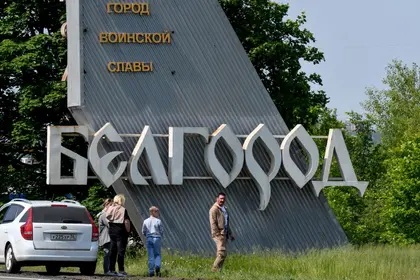Climbing Russian casualty figures and Belgorod events may be shifting Russian public opinion against the war on Ukraine and/or against the Kremlin, according to an AI-based evaluation.
Using AI, FilterLabs, an independent consultancy, has been tracking Russian society’s attitudes toward the war, its progress, and toward Russia’s leadership since the beginning of the full-scale invasion.
JOIN US ON TELEGRAM
Follow our coverage of the war on the @Kyivpost_official.
In speaking to CNN yesterday, Dr Jonathan Teubner, the CEO of FilterLabs, said that monitoring using Artificial Intelligence (AI) methods showed that in general Russian attitudes toward the war had been “fairly stable” over its course.
However, he noted that, in recent months, increased public reporting and knowledge about Russian casualties has “bled a lot of support [for the Kremlin].”
“The way it’s been manifesting is negativity toward casualties. A lot of Russians are complaining about that,” Teubner said
“But it hasn’t yet translated into negativity toward the war although we think there are some places where that is changing,” he said.
The CEO last week also told the New York Times that “the reality of casualties is still one of the Kremlin’s greatest vulnerabilities.”
Teubner suggested that Belgorod may be a distinct point in Russian attitudes toward the war and toward their government.

Moscow Prime Suspect for Sabotage Aimed at Disrupting Olympic Games
“When there was an attack on Belgorod… what we saw was one of those moments where negativity turned against the war itself and the Kremlin itself,” Teubner said to CNN.
“All of sudden when the war came into [Russians’] lives, it was that way,” Teubner said.
FilterLabs uses an AI method called ‘sentiment analysis’ to track Russians’ attitudes.
First, the method trains and uses computers to read and understand human-generated text and speech.
Then, it evaluates scraped public documents and comments across social media, news media, messenger app groups (including Telegram, which is widely used in Russia), and other popular forums to gauge what people are thinking and feeling at the local level, and whether that sentiment is trending positive or negative.
FilterLabs has previously detected shifts in Russian attitudes.
For example, when Russian armed forces met much fiercer resistance from Ukrainians in March and April 2022, and reports of high death tolls filtered back into Russia, FilterLabs detected a decrease of support for the war in many regions of the country.
When the nationwide ‘partial mobilization’ was announced in September 2022, there were demonstrable dips in the effectiveness of pro-war propaganda.
“The analysis suggests that Russians, especially outside of Moscow, are not buying the propaganda as they once were,” Teubner wrote in Politico in February 2023.
“The Kremlin has also been unable to use its propaganda to sustainably mobilize popular sentiment around an affirmative agenda, in this case its war in Ukraine.
“Our analysis suggests that the social contract between Russians and the Putin regime is fraying,” Teubner wrote.
You can also highlight the text and press Ctrl + Enter






